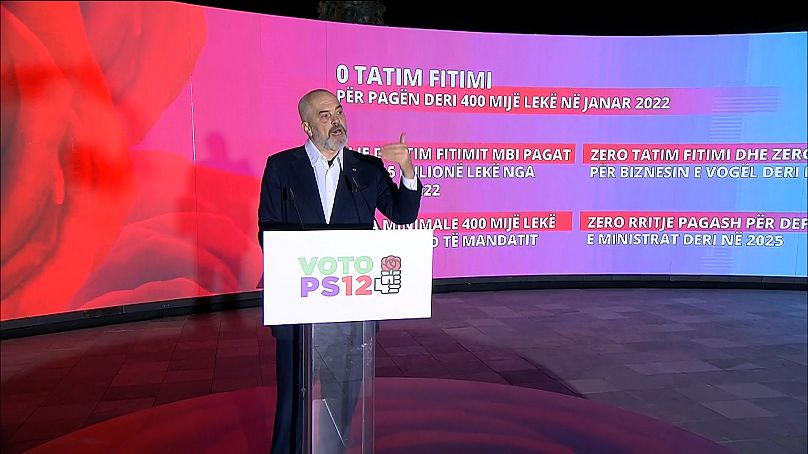The Socialist and Democratic parties chose to begin their month-long election campaign in the same city.
Albania’s prime minister, Edi Rama, was heckled by supporters of opposition candidate Lulzim Basha ahead of the country’s election on 25 April.
 ADVERTISEMENT
ADVERTISEMENT
 ADVERTISEMENT
ADVERTISEMENT
Democratic Party supporters shouted: ‘Rama leave’ during a speech in the battleground city of Elbasan.
Rama said it was a “vulgar sight [which] showed the degradation of an old-fashioned opposition.” Basha meanwhile excused the actions of his supporters, which he said was “a result of the prime minister’s connection with criminals.”
The SP, which has led Albania for eight years, faces a coalition between the DP and smaller opposition parties but still looks likely to win the 71 sears needed to form a government in one month’s time. A total of 13 parties are contesting the election including a potential third force in Albanian politics, the Socialist Movement for Integration (SMI).
The build-up to the election has already seen incendiary rhetoric directed at political opponents on all sides and has prompted the European Union to issue a warning that parties should uphold mutual respect, dialogue and restraint and avoid hate speech.
“Transparent, inclusive, and free and fair elections, as well as respecting the results, are crucial in guaranteeing the legitimacy of the new Assembly and government. We trust that the respective Albanian institutions and political actors will act in compliance with international standards and decisions of the Central Election Commission,” an EU statement read.
There has also been a focus on criminality in Albania’s political realm, with a call for candidates with criminal records or links to organised crime to be banned from running in the election.
COVID-19 has also complicated the build-up to the April 25 poll, with calls for the restriction of mass gatherings and public rallies. But on Thursday night, the streets of towns and cities across Albania echoed with the sounds of supporters heading for public squares.
Both Basha and Rama chose to launch their campaigns with rallies in the same city, with Basha addressing a huge crowd in his opening speech.
The SP and DP have both put economic recovery at the heart of their political programmes. The SP has promised a wage hike for teachers and medics as well as infrastructure projects such as new road construction, a new train line between Durres and Tirana and a leisure port at Durres.
The DP meanwhile has promised changes to the country’s taxation system, as well as increases in wages and pensions. The party has also committed to infrastructure projects including road connections that would better connect Albania with its neighbours.
Third mandate
In his speech, Rama warned that a vote for his rivals would be a step backward and asked for a third mandate, having won the last two elections, to continue his work.
“The third mandate is for Albania so that it never goes back to the state it was several years ago because with the third mandate we will move forward with the reforms and the opposite will mean a loss of all these efforts and sacrifices we have made,” he said.
Basha, meanwhile, claimed that he would advance the country’s path to EU membership. He has accused Rama of paralysing the country during his two mandates.
“I stand here in front of you to announce another mission, that if elected PM, my first and foremost duty will be that of Albania’s EU integration,” he said.
“We must stop the poverty that has gotten hold of this country at all costs. The evil that has stolen what God has generously given Albania. We are fighting against a group of people that would do anything to stay in power.”
April’s election will be the first to be held since reforms to Albania’s electoral code, including the introduction of preferential votes for candidates in party lists, as well as the introduction of electronic voter identification which will be piloted in a district of the capital, Tirana.
Changes further strengthen penalties in case of use of public assets during the campaign as well as violations such as vote-buying or other electoral offenses.
How will Albania vote?
National surveys conducted by Euronews Albania together with international survey agency MRB found that the majority of Albanian citizens believed the Socialist Party will come in first place, but the difference between SP and DP has considerably narrowed.
Asked who they would cast their vote:
Socialist Party (SP) – 41.3% of the ballot
Democratic Party (DP) – 30.8% of the ballots
Socialist Movement for Integration (SMI) - 7.6% of the ballots
Party for Justice Integration and Unity (PDIU) – 1.3% of the ballots
Undecided voters, implying respondents that said that they will not vote, do not know, or refused to answer were measured at 17.9%, a rising trend compared to the findings of the two previous surveys where undecided voters were measured respectively at 16.1% and 17%.











